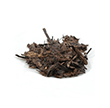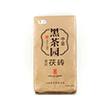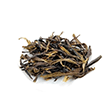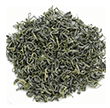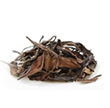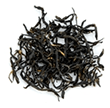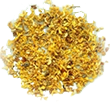1980s Menghai "7572" Puerh
 One usually doesn't consume much shu puerh, indulging only occasionally during the hot summer or once in a while for meditation. Today one has a craving for some old shu.
One usually doesn't consume much shu puerh, indulging only occasionally during the hot summer or once in a while for meditation. Today one has a craving for some old shu.
This sample was gifted by Daniel at The Chinese Tea Shop in Vancouver, who stocks a nice variety of cakes. It is of the classic 7572 recipe. This recipe was one of the first to be pressed into a cake by Menghai in the 70s. Let's boil the water, take in the moisture kicked up by the kettle, and enjoy some classic shu...
The smell of the dry leaf is pretty generic- the dusty, stale, must of a long storage. Faint dry wood notes predominate. The tea is placed in yixing and a rinse pushes outmore of the smell of storage.
 The first infusion reveals an initial burst of sweetness under the strong heavy characters of this tea. A velvety mouthfeel is full of creamy but sharp coco notes. The aftertaste is slightly fruity with a nice grain character to it. Minutes afterward creamy chocolate is carried with the breath. The mouthfeel further evolves into a mild comforting dryness which coats the mouth.
The first infusion reveals an initial burst of sweetness under the strong heavy characters of this tea. A velvety mouthfeel is full of creamy but sharp coco notes. The aftertaste is slightly fruity with a nice grain character to it. Minutes afterward creamy chocolate is carried with the breath. The mouthfeel further evolves into a mild comforting dryness which coats the mouth.
 With creamy chocolate echoing in ones mouth the second infusion is prepared. It starts off with a slight sour-sweet burst lying in the thick oily soup of coco and decomposing wood. There are very medicinal notes that hide under other flavours then fade away. The mouthfeel is malty, thick, oily, and finishes slightly dry. The chaqi moves downward warming the lower cavity and comforting the stomach.
With creamy chocolate echoing in ones mouth the second infusion is prepared. It starts off with a slight sour-sweet burst lying in the thick oily soup of coco and decomposing wood. There are very medicinal notes that hide under other flavours then fade away. The mouthfeel is malty, thick, oily, and finishes slightly dry. The chaqi moves downward warming the lower cavity and comforting the stomach.
The third and fourth infusion start once again with a sour-sweet kick. There are raisin-like and medicinal notes here but they are smooth and meld into creamy coco on the breath. The mouthfeel remains viscous with a slight dry finish. It really gloops over the mouth and paints it in a thick coat all the way to the throat. The chaqi is quite heavy and burrows deep and downward. Ones hands and arms feel almost cool in juxtaposed with the light, soft warming feeling down below.
 The fifth and sixth infusions have much more woody notes up front along with thick creamy coco notes that dominate the creamy taste of this tea. Thin dry wood stretches into chocolate in the aftertaste as well. The mouthfeel is very full but slightly less oily. The chaqi is compounding and bringing elevated alertness. One quiets here in the present.
The fifth and sixth infusions have much more woody notes up front along with thick creamy coco notes that dominate the creamy taste of this tea. Thin dry wood stretches into chocolate in the aftertaste as well. The mouthfeel is very full but slightly less oily. The chaqi is compounding and bringing elevated alertness. One quiets here in the present.
The seventh, eighth, and ninth infusions maintain the core creamy, smooth coco, velvety taste with a progression to more dry wood notes in the aftertaste. The woody flavour is a creamy, velvety wood much more than it is drying. One takes a break from this tea and goes for an evening walk before returning to the table.
 The tenth infusion comes once again with more woody, dry notes within the creamy coco base which is becoming more and more ghostly as the session progresses. Slight plum now accompanies wood notes.
The tenth infusion comes once again with more woody, dry notes within the creamy coco base which is becoming more and more ghostly as the session progresses. Slight plum now accompanies wood notes.
The eleventh and twelfth infusions are long and slightly dry. Milky wood notes and many sweet, fruity hints are in there as well. The mouthfeel has lost its oily core but applies a thin fuzzy coating over the mouth and throat.
 This tea is taken for a few more long infusions late in to the night before being put to rest with an overnight steeping. In the morning, one is greeted with cinnamon, mainly musty storage, and deep medicinal tastes.
This tea is taken for a few more long infusions late in to the night before being put to rest with an overnight steeping. In the morning, one is greeted with cinnamon, mainly musty storage, and deep medicinal tastes.
Peace.
Posted by Matt Tuesday,
February 1, 2011
http://mattchasblog.blogspot.com/2011/02/1980s-menghai-7572-puerh.html#uds-search-results
Mattcha's Blog is one of the best and most popular tea review sites on the Internet. The reviews are passionate, knowledgeable and objective and are beautifully written and presented. Whether you are new to tea drinking or an expert, this site is a must see. Visit http://mattchasblog.blogspot.com for more great reviews.
 Top of Page
Top of Page

Ask The Tea Wizard
Don't know which tea is right for you? Answer a few questions and the Online Wizard will show you all the Chinese teas that suit your taste.


